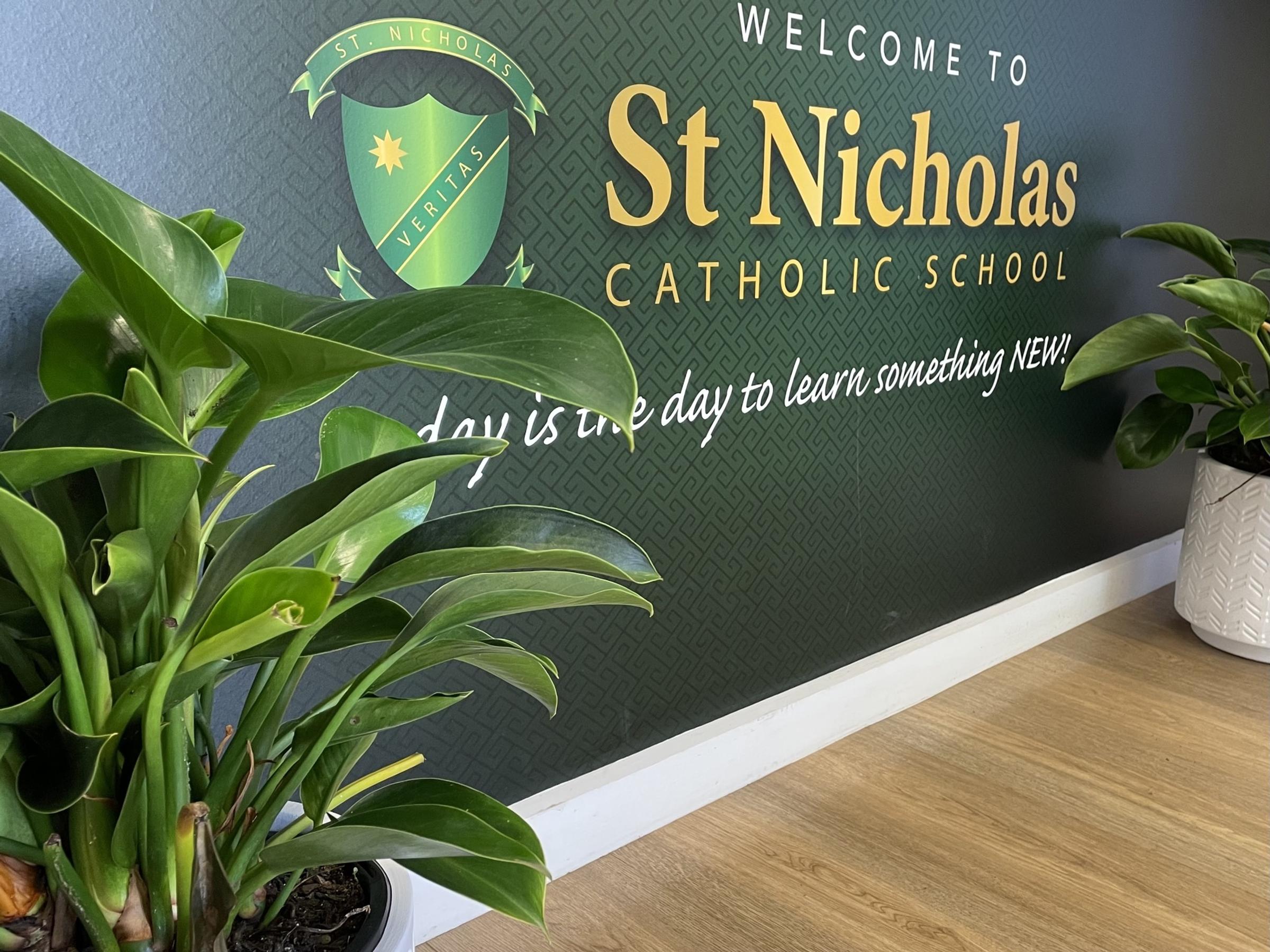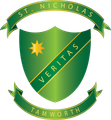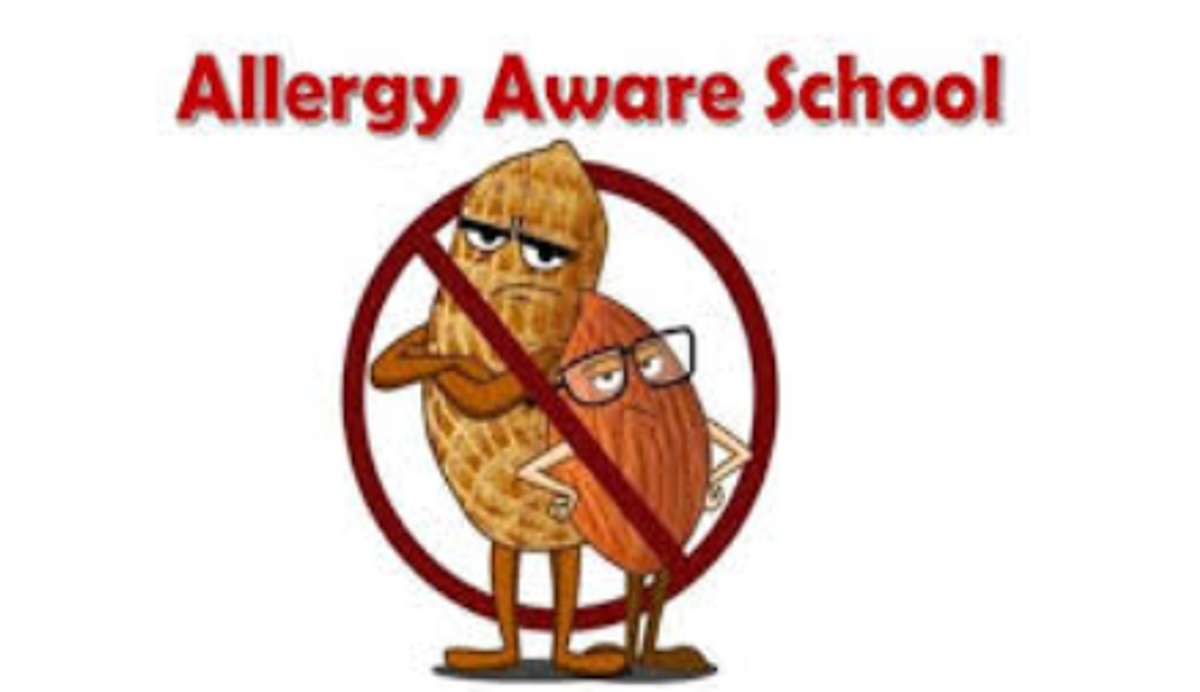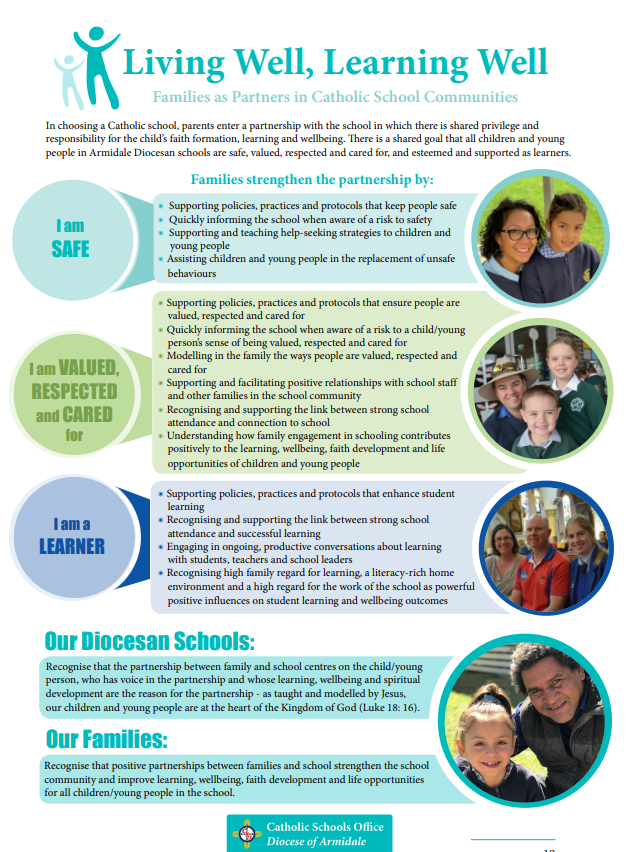GENERAL NEWS

WE ARE A NUT AWARE SCHOOL
Please remember that we are a nut aware school. We strongly encourage parents not to send food containing nuts to school as we have children in our school who have anaphylaxis. Thank you for your continued support.
NORMAN UPDATE
Our furry wellbeing friend Norman, continues to bring so many smiles and wonderful support when he attends St Nicholas School twice a week. Now that our students are more familiar with his lovely presence, just a little reminder that we all still need to follow the guidelines outlined through our Dogs Connect mentorship. Perhaps you can have a chat with your children about this at home.
And with all the rain we are currently enjoying, it's so good to see Norman still out and about at the front gate greeting students with Mr Clery. How cute does he look in his wet weather gear?
SURVEY MY SCHOOL
An annual satisfaction survey of parents, students and staff will be conducted on behalf of all Catholic schools in the Diocese this term. The surveys are designed to gather feedback from parents, staff and students about our school and will be used to inform school improvement. Responses are confidential, and individuals can not be identified.
The surveys will be launched on Monday 26 August 2024 via Compass. Please look out for the Compass push which will contain the link to the survey.
PUPIL FREE DAYS
The following are the Pupil Free Days for the remainder of 2024.
Please mark in your diary....
- Monday 14th October
- Friday 20th December
ICAS ASSESSMENTS 2024
Registrations have now closed for our Year 4, 5 and 6 students to participate in the ICAS Assessments in 2024. Students who registered will be required to sit the ICAS Assessments on the following dates.
- Maths - Monday 26 August
Mrs Shelly O'Sullivan will be coordinating and supervising. If you have any queries, please do not hesitate to contact Mrs O'Sullivan.
sosullivan@arm.catholic.edu.au.
Anxious kids? Teach them to take off their anxiety goggles
by Dr Jodi Richardson
Do you find it hard to focus on the present?
There’s always so much to do and plan for as parents. It’s no wonder our minds wander so much. But to think that we spend nearly half of our lives thinking about things other than what we are doing means there’s an awful lot we’re missing out on.
When we’re fully engaged with what’s happening, there’s so much to experience. Bringing our thoughts back to the present moment can be like landing them on a calm, quiet, relaxed island in the midst of stormy seas.
When our minds wander to troubling thoughts, we end up experiencing pain and suffering at times when we’re often warm and dry, fed and watered, safe and secure. Like when we’re in bed. Snug and relaxed in our comfy beds, our doona keeping us warm (or a sheet to keep us cool), with a lovely soft place to lay our heads. Could we be more content in that moment? If only our minds would stay with us!
It’s the same with our kids. It’s often at the end of the day when they’re no longer engaged in activities that they begin to think and worry.
Their minds are far away from the reality of being safe in their rooms with loving family close by but they are sick with worry about future events.
Sometimes thoughts are so ‘sticky’ it’s hard to let go
It’s hard being a wandering minds back to the present when we’re so swept up in our worries. It takes practice to notice a wandering mind, gently ‘unhook’ from the thought and return our attention to the present moment. That’s the practice of mindfulness. Notice, unhook, return, repeat.
Put your head where your hands are
A lovely woman at one of my retreats told me her grandma’s favourite saying was “put your head where your hands are” meaning think about what it is you’re doing while you’re doing it. That’s smart!
Noticing our thoughts are wandering and bringing our attention back to what we’re actually doing is a skill, which gets easier with practice. It’s a powerful skill to teach kids as it to gives them perspective and importantly, the space they need for positive change.
Viewing the world through anxiety goggles
When our kids feel anxious they look at what’s happening around them through ‘anxiety goggles’. It’s like when you look through a pair of glasses with red lenses and everything looks red. Take them off and all is clear again. What if we could help our kids to take off their anxiety goggles and learn to look at their thoughts rather than from them? It would bring them such relief.
Creating a lovely space between our kids and what they’re thinking
We can help our kids do this by developing their metacognition (thought-noticing) skills. That way, when their minds wander to their worries and troubles they can notice they’re actually ‘lost in thought’ and not really experiencing the events they are thinking about. It would help them to ‘unhook’ from their daydreaming and importantly, bring their minds back to the present moment.
Thought-noticing
This is a wonderful skillset which helps our kids to manage their mental health. When kids tune into their thinking, they immediately distance themselves from it. Rather than being lost in the thoughts that are making them feel anxious, they can mentally step back and see the thought for what it is. Just another thought that comes and goes like all the ones before and all the ones to come.
Teaching thought-noticing to kids
There are many ways to teach thought noticing to kids. Look at these ideas like a ‘Choose your own adventure’. Start where you like and go in any direction that feels right for you and your family. If the idea you try isn’t quite the right fit, choose another!
Do you hear what I hear?
Lay down comfortably side by side and spend 2 minutes listening for any sounds you can hear, near or far. When you’re finished, compare what you heard and open a discussion about how our minds often wander away with our thoughts. Kids will know this as ‘daydreaming’. Share how your mind wandered and invite your child to do the same.
Tell me more
Day-to-day conversations are great for thought noticing. It’s about asking the right questions. Here are some examples to get the thought noticing conversation started: “Can you tell me more about why you think that? Why do you think you got so upset when we had to go straight home? Why do you think you’re putting off doing your homework? How will you know when your painting is complete?”
Name your mind
If we get our kids to give their minds a name, we open up opportunities to ask them different questions. For instance, if your child name’s his/her mind Sam. You can ask your child what Sam is thinking. This encourages your child to step back and take a helicopter view of him or herself.
Post-meltdown reflection
In the aftermath of a meltdown or outburst, when calm has returned and your child or teen has moved on, take some time to ask why he/she got so upset over what happened? Ask questions like “what did your mind say to make you feel upset?” for younger children or “can you tell me what you were thinking that made you feel so angry, frustrated, disappointed etc.?” for older kids.
Developing metacognition or ‘thinking about thinking’ skills fosters self-regulation among children. As contributing to children’s mental health and happiness, metacognition helps kids be more successful, more resilient and be able to problem-solve because they are less likely to get caught up in their worries.
And remember, your GP is a great place to start if you have any issues with your kids that you’d like reassurance or advice on. Make time for a chat.
VERITAS AWARDS
Our Veritas Awards stem from our school motto - ‘Veritas’ - meaning truth. The Veritas Award is awarded to students who have been consistently displaying citizenship, leadership and/or Christian Living. Students receiving a Veritas Award are those students who have displayed our ‘Rules for Living’ in their everyday interactions. This term our focus is on ‘Valuing, respecting and caring for others’.
Congratulations to the following children who received Veritas awards this week: Gabriella Sleiman, Juno Betts, Kaitlyn Miller, Mila Kilby, Emily Waugh, Logan Whitney, Harper Charlesworth, Lincoln Dowden, Maximus Hodges, Harry Marshall, Oliver Creighton, Aaron Amalakumar, Cleo Cook, Hayley Lye, Xander Kidd, Willow Bird and Myah Prussing.
SUPERVISION OF STUDENTS
All parents need to be aware, our supervision of students
does not begin until 8.15am each day.
St Nicholas School gates will not be open until the arrival of the first school bus at approximately 8.10am. It is not appropriate for children to be at school before this time with no supervision.
If your child/ren require care before 8.15am you may like to consider before school care here at school with Esteem.
MEDICAL PLANS
With the cooler weather and many respiratory viruses circulating it is a good time to check your child's Asthma and Allergy plans and make they are up to date. Please be aware that all plans need to be renewed annually. Updated plans can be emailed to sntadmin@arm.catholic.edu.au . Please also ensure you provide the school with the relevant medication/ventolin that is in date. (All medication is required to be kept at the front office).




